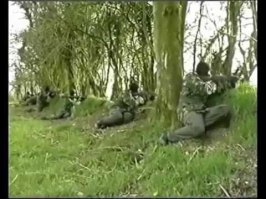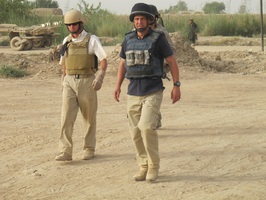Celebrating Colonialism
Whatever you may think of her views Lily Allen is entitled to have them. Some of the commentary regarding her response to this week’s London underground message board is at best bad manners and at worst simply appalling. Right or wrong, play the ball and not the woman.
Rourke’s Drift. Anyone who has seen the film “Zulu” will recognise the name. Stanley Baker’s 1963 epic action movie portrayed the garrison of 140 British and Boer soldiers holding off an attack by 4000 Zulu warriors on the afore mentioned mission station on January 22/23 1879. A favourite of many, it portrays the gallantry and courage of both sides and shapes many people’s perception of what happened in both the real battle and the war. So how accurate is it?
In general terms, yes the battle took place on those dates in that location and the garrison survived. It is however fair to say that much of what takes place in the film is fiction. For goodness sake, the actual soldiers were not even Welsh and singing “Men of Harlech” would have been one of the last things on their minds. It is possible to fill many pages with pedantic detail on where the film gets it wrong. This is not revisionist history being applied, it is simply accurate history.
11 Victoria Crosses were won at the battle. There is evidence to suggest that this number was so high in order to deflect public criticism over the loss of over 1100 soldiers at the preceding battle of Isandlhwana. However let us not quibble and accept that for the average soldier on the barricades it must have been pretty unpleasant. They would all have been there for different reasons but I doubt that many would have had any colonialist agenda.
So, does Lily have a point? There is little doubt that the British provoked the war and pursued an aggressive policy in South Africa. In this sense it was colonialist. But it’s not that simple. The Zulu empire was no less unscrupulous in its own expansion. Add to the mix Boer influence and ambition and it’s hard to find anyone with good intentions. Should we agree that to remember the soldiers is not the same as remembering those who put them there.
Happy Xmas
This anecdote may not sit neatly in the Civ-Mil or Xmas firmament but I wanted to a tell it because the incident it describes made a great impression on me. Even now I find it difficult to relate and whilst it may be an old story I believe that the message is important.
I was waiting for my flight at RAF Brize Norton before deploying to Afghanistan. There I was, a man in his fifties and a civilian just watching the young boys and girls who very shortly would most likely be in action. Standing in the car park I saw a young Captain saying goodbye to his father. It was a very British scene, the young Captain seemingly without a care in the world and a father desperate not to let his child go. A few cursory words and forced smiles were followed by a brisk handshake and the officer went about his business of getting on a flight. The father got back into his car and sat staring as his son departed - his face a picture of complete sadness. As I watched I thought back to the times when I was that officer getting on a plane, in my case to Aldergrove, leaving behind who knows what.
So, my advice to all those who find themselves in a similar situation is that whilst it is mostly about you, it’s not all about you. Tell all those who love you that you love them. Whoever you are, don’t forget those who are staying behind and who love you more than you realise.
Stay safe and happy Christmas.
Doing the Right Thing
At the time of writing the BBC are running a trailer for a series called 'Hospital' (you can find it here). It centres on the theme of having to prioritise according to clinical need in an environment where resources are stretched. I'm sure that civmil practitoners will recognise the challenge.
I just wanted to highlight the words of a lady who appears in the advert and articulates the problem perfectly:
'I do the right thing all the time in this job but it's not always the right thing for one person. I do the right thing for the hospital and that's really difficult. Sometimes I stop things happening but that's who I am'.
Presumably we can all support this approach? Until the one person is a friend, relative, is photogenic, politically convenient, media aware etc etc probably.
Academic
I've had quite a few enquiries from students undertaking research for Masters or PhD theses. I am more than happy to support such endeavours so please feel free to contact me with reasonable requests.
War is Over.....
'We'll never do another Afghanistan'. I hear this a lot at the moment but I'm never quite sure what people mean by it. Presumably it's referring to a range of factors including ill defined civmil structures, propping up corrupt regimes, firehosing development money in all directions, 'mowing the lawn' and let's face it, leaving rather quickly.
I beg to differ. We'll be faced by an increasing range of failed states which will inevitably draw us in - Syria, Libya, Yemen, South Sudan are all current candidates. What happens when the exploding birthrate of Saudi Arabia overtakes the regimes ability to buy its population off? Or Kenya follows the same lawless path as Zimbabwe allowing dissident groups to flourish?
So if we do find ourselves in the position of having to intervene what are the top three things we need to get right from a civmil perspective?
1. A properly defined, unified managment structure that is civilian led
2. A security effort that is truly intelligence based
3. A simple influence effort that is commonly understood
To which might be added, a willingness to see things through. It will not be cheap in any sense.
Who's next?
After the recent attacks in Paris there seems to be an acceptance that something similar will sooner or later happen in the UK. Well it already has. In the 80's and 90's the IRA were routinely gathering large teams to conduct attacks in Northern Ireland. Imagine the outcry if ISIL assembled two Dushka's and three FN machine guns in a multi weapon shoot somewhere in Europe. Just type 'Battle of Newry Road' into You Tube and you can watch it happen on British soil 25 years ago.
It doesn't happen any more and Ok, the circumstances are different but the point remains. It is largely a thing of the past because there was a general recognition that only a political resolution could end the impasse. Security measures are not an end in themselves - sooner or later everyone comes to the table.
Passion - the new black
In order to demonstrate total, utter, complete and all absorbing commitment to a task these days it seems sufficient to declare oneself 'passionate'. It is like whispering a spell. Say it and the client can rest assured that because the p-word has been invoked all will be well, wont it?
Personally I'd be happier with someone who declared themselves to be a cold hearted bastard who will deliver a contract to the agreed terms of reference and then went fishing at weekends. At least everyone knows where they stand.
Angels and Heroes
We tend to believe our own propaganda. All servicemen and women are 'heroes' and all health workers are 'angels'. So the latest story of the RAF Sergeant attending a Hospital A&E Department and apparently being treated in a less than heroic manner makes for uncomfortable reading. The specifics of the case will no doubt be examined by the Trust but there are a few principles worth highlighting regarding the incident management:
1. Reporting suggests that a serviceman was hidden away from other patients because his camouflage uniform might cause upset. It appears that there had been a recent incident where there was friction between military and civilians as a result of similar circumstances. If true, it is hard to believe that the staff dealing with the incident were not acting with the best of intentions. Stopping an incident before it might start seems eminently sensible. It is not clear how the Sergeant was told that he was going to be isolated but perhaps he should have simply been offered the choice.
2. That said, why should anybody, uniformed or not, be subject to harrassment wherever they may be. I am led to believe that the police are frequent visitors to A&E Departments and if staff felt there was a genuine risk then they should have been called. Service personnel are entitled to protection under the law like everyone else.
3. The wearing of uniform in public has always been an on/off matter for the MOD. Targetting of off duty servicemen is a feature of modern life and maintaining a low profile is only prudent. Whatever the rights and wrongs of this posture the fact remains that a uniform can attract trouble. And vice versa.
4. The real error by the Trust was to present the event as impacting on other patients by somehow upsetting them. I am not aware that it is acceptable to walk into anywhere with a list of people that may upset you and then expect the offenders to be segregated. If uniforms sned you into an angry rage whose issue is it?
The Trust should not panic. The incident will quickly pass and doubtless it will happen again somewhere else. Perhaps next time a quiet word in the ear of the serviceman asking if he would 'like to come and sit in our VIP room?' And the Doctor comes along quickly.
Deployee Guide
I have recently been involved in the drafting of guidance to civilians who find themselves working on a military exercise. The finished document can be be found at:
http://sclr.stabilisationunit.gov.uk/publications/deployee-guide-series
There is a second document available which covers operational working in a military HQ. Both, I think, are worth a read.
If time permits it is worth spending some of it reviewing the recently expanded reference section on the site. The Stabilisation Unit has created an excellent library of 'best practice' guidance which collates the substantial experience its members have acquired over the last few years.
The Dyson Airblade
The Gents toilet in the UK Provincial Reconstruction Team (PRT) HQ in Lashkar Gar was furnished with a Dyson Airblade. Essentially a sophisticated hot air blower, it came to represent for me a symbol of our commitment to Afghanistan. As long as it worked I figured that we were willing to provide the wherewithal to service it, clean it and mend it if it went wrong. If the infrastructure was functioning so too was the Dryer and to be fair, I never once left the loo un-blown. Of course, that infrastructure supported not only the means to dry my hands but the entire development and security lines of operation.
It raises the possibly uncomfortable question of was an Airblade really necessary? And if not how much else were we supporting that was inappropriate? How about the 3000 water pumps sitting in a field in Nawa District that were never distributed because by using them a small number of farmers could empty the irrigation network in very short order with catastrophic implications for the wider community. The consequences were not properly thought through and perhaps it was one of those occasions where 'do nothing' but let the locals sort it out might have been the better option.
I'm sad to say that the Airblade did not make it past drawdown. Just like us, it's not there any more.



